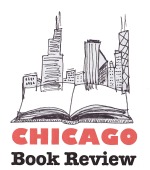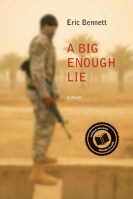 A Big Enough Lie
A Big Enough Lie
A Novel
by Eric Bennett
John Townley is waiting for his second appearance on a popular talk show to commence. He’s ready for it, for the game to be up. He’s ready to come clean—on national TV.
John Townley is Henry Fleming. He is John Marshall. He is John Patrick Crane, who goes by his middle name. He is all of them, although in many ways none of these men exists as a full being, even if they all combine to make up one man.
So it goes in A Big Enough Lie, a story that explores the gray areas between truth and fiction, fact and fabrication, perception and reality. It uses as its backdrop war and violence, writing and storytelling, romance and relationships—all of which reside in those murky gray areas where perceptions are always changing and  reality is never quite real.
reality is never quite real.
A Big Enough Lie is structured as a story within a story. We first meet John Townley, a small-town boy full of naïveté and big dreams, little ambition, and even less direction, as he prepares to shed light on his story during a television appearance with an Oprah Winfrey-like celebrity host. He fancies himself a writer, even if “he referred to himself as a writer and thought often about writing but wrote little.” Most of his literary efforts are spent on crafting love letters to Emily, a slightly older girl who becomes a woman when he isn’t looking and who adores him but doesn’t really love him. He writes, destroys, and rewrites letter after letter to her, cringing at his own pomposity, his own inauthenticity, his own fakery, knowing he will never be able to write with the ease or honesty that, at least as it seems to him, Emily does.
Even so, and despite nothing to show for it, John Townley insists on thinking himself a writer. Eventually, he does write a story—a memoir—worth publishing, and it’s a doozy. But it isn’t his story, or at least it’s not really his own story to tell even if it has become palpably real to him.
Part love story, part commentary on war, part cynical look at writing and publishing, A Big Enough Lie is at its heart a look at the struggle to become who we are. John Townley is a rather pathetic character, but it’s not all that difficult to empathize with someone who is so obviously floundering, limping through life with eyes only half open. The reader can feel for John Townley, hapless as he is, because he’s somehow earnest even when he’s being deceitful. He doesn’t lie intending to hurt people; he just can’t seem to tell what truth is what it is not. When he finally works up the guts to be honest with himself (and everyone else), his mettle is tested further as those around him grapple with their own truths, making the notion of coming clean a trying one.
There is a lot going on in these pages. Author Eric Bennett has tackled a lot of issues here, and he has populated his story with a lot of people. A Big Enough Lie is a story full of misguided characters telling mistruths as they pursue their misguided dreams. It’s a complicated story, told in a nonlinear fashion by an unreliable narrator. And yet it is a fascinating story as well, a thoughtful, heartbreaking satire of love and life, even if characters go largely unredeemed, even if loose ends aren’t entirely tied up.
A Big Enough Lie is not an easy read. It twists and turns and jumps around. It requires focus and flexibility. But it’s also punctuated by some fine writing, full of feeling, evoking laughter and tears alike. It is dark and witty and biting and sad and heartfelt. It digs and it needles and it sticks. It might be ambitious, but it’s not ineffective. It might be difficult, but it’s not unrewarding. As such, it’s worth the read because it’s a good book that will make readers think, a book that will stick with them. And a book that can do that is worth the effort.
June 2015, Triquarterly Books/Northwestern University Press
Fiction
$17.95, paperback, 285 pages
ISBN: 978-0-8181-3121-7
—Reviewed by Kelli Christiansen




